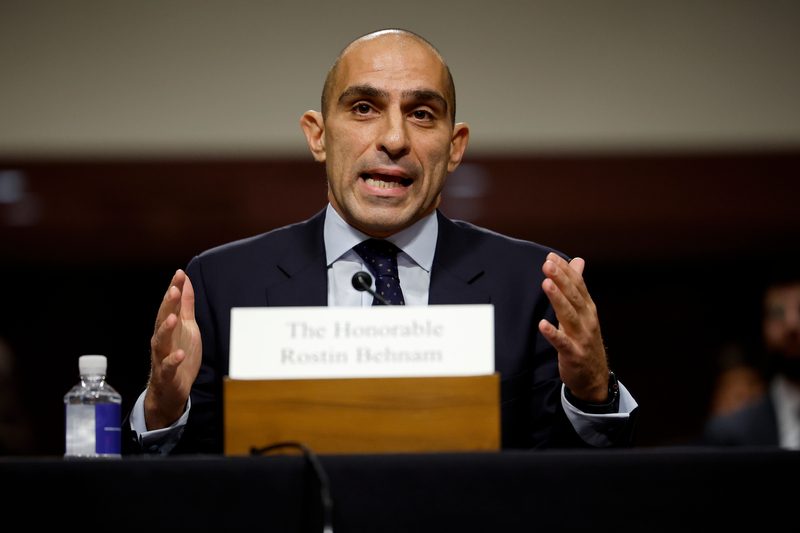One of the US’s top financial regulators has shown concern about the existing ‘insufficient’ regulation for digital assets, which include bitcoins and other cryptocurrencies.
Rostin Behnam, chair of the Commodity Futures Trading Commission (CFTC), told the Financial Times there was currently a regulatory gap around the crypto industry.
He also said he was concerned about recently flourishing practices of putting bets on elections and other political events, and called for more scrutiny of political betting markets.
Regulation gap
“You still have a large swath of the digital asset space unregulated in the US regulatory system and it’s important – given the adoption we’ve seen by some traditional financial institutions, the huge demand for these products by both the retail and institutional investors – that we fill this gap,” Benham said.
His remarks follow a remarkable surge in prices for crypto currencies in the aftermath of Donald Trump’s victory in the US presidential election, with bitcoin breaking records by crossing the $100,00 price barrier. It should be noted, though, that even before the post-election rally, assets like bitcoin posted notable gains over the past year or so. Much of the credit goes to early success of a new way to invest in the asset; namely, spot bitcoin ETFs, which were approved by US regulators in January.
Benham said he will step down from his post on January 20 – the same day Trump will be inaugurated. The incoming president is yet to name a successor.
Trump policies get mixed reaction
There are mixed feelings among the US financial regulation sector about Trump’s future regulatory policies, especially around cryptocurrencies.
Matters kicked-off even before the election when Trump told a bitcoin conference last year he would fire the crypto-skeptic chair of the SEC, Gary Gensler, on his first day back in office as president.
The CFTC under Behnam was seen as easier on the cryptocurrency industry when compared with Gensler and the liberal commissioners at the SEC.
With that said, Benham has said it is unwise to take any shortcuts toward crypto regulation, and his agency brought numerous lawsuits against cryptocurrency companies, most notably the now-defunct crypto exchange FTX after it imploded in 2022, plus an enforcement action against Binance – the world’s largest crypto exchange – and its founder Changpeng Zhao in 2023.
Nevertheless, his departure clears the way for Trump to appoint his own CFTC chief and launch a crypto policy overhaul. Trump has surrounded himself with individuals who are openly against regulatory scrutiny around cryptocurrencies. He also already nominated Paul Atkins, known as a strong backer of cryptocurrencies, to take over as SEC chair.
And David Sacks, another crypto enthusiast, has been nominated as the White House’s AI and crypto czar.
The mixed reactions to Trump’s picks reflect the range of views about a looser regulatory approach in general. For instance, Trump’s choice of Atkins has raised concerns among some consumer groups that are worried Atkins will be too lenient as the new Wall Street cop.
In a statement last month, Dennis Kelleher, the President and CEO of Better Markets, called Atkins “smart, experienced, and capable.”
But Kelleher also warned of Atkins’ close ties to the business sector. “Unfortunately, he is also a deregulation zealot and industry cheerleader who, as a Commissioner at the SEC from 2002-2008, supported deregulation that contributed to the devastating 2008 crash,” he added, referring to the global financial crisis.
Less regulation in US, but not a free pass
In addition, the European Union is moving toward more enforcement in the crypto sector, which affects global businesses. New EU rules, effective December 30, require large stablecoins – tokens that facilitate trades in bitcoin, ether and other risky digital assets by converting them on a one-to-one basis into dollar, euro or other fiat currencies — to park 60% of their reserves in bank accounts.
What might be more exciting to watch is how governments and businesses harness blockchain technology. Blockchains are distributed databases (or ledgers) shared across a computer network’s nodes, and they play a crucial role in cryptocurrency systems, maintaining a secure and decentralized record of transactions.
Hong Kong is exploring digital representations of everything from green bonds to electric-vehicle charging stations, and Singapore seeks to replace manual processes with “smart contracts,” or self-executing computer code, to speed up fund management, private banking, and many other segments of its large financial-services industry.
Like any alternative and still relatively new investment product, investing in crypto comes with risk, and it should probably be done with money that one is prepared to lose.
And, along those lines, maybe we’ll see the financial regulators engage in more financial education and retail investor outreach in this arena, and the too-much or too-little enforcement debate will be a bit beside the point.

















